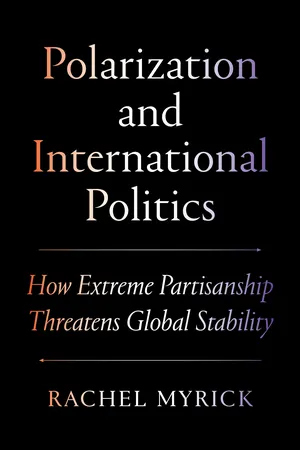
Polarization and International Politics
How Extreme Partisanship Threatens Global Stability
- English
- ePUB (mobile friendly)
- Available on iOS & Android
Polarization and International Politics
How Extreme Partisanship Threatens Global Stability
About this book
How extreme polarization undermines the advantages that democracies have when formulating foreign policy
Polarization is a defining feature of politics in the United States and many other democracies. Yet although there is much research focusing on the effects of polarization on domestic politics, little is known about how polarization influences international cooperation and conflict. Democracies are thought to have advantages over nondemocratic nations in international relations, including the ability to keep foreign policy stable across time, credibly signal information to adversaries, and maintain commitments to allies. Does domestic polarization affect these “democratic advantages”? In this timely book, Rachel Myrick argues that polarization reshapes the nature of constraints on democratic leaders, which in turn erodes the advantages democracies have in foreign affairs.
Drawing on a range of evidence, including cross-national analyses, observational and experimental public opinion research, descriptive data on the behavior of politicians, and interviews with policymakers, Myrick develops metrics that explain the effect of extreme polarization on international politics and traces the pathways by which polarization undermines each of the democratic advantages. Turning to the case of contemporary US foreign policy, Myrick shows that as its political leaders become less responsive to the public and less accountable to political opposition, the United States loses both reliability as an ally and credibility as an adversary. Myrick’s account links the effects of polarization on democratic governance to theories of international relations, integrating work across the fields of international relations, comparative politics, and American politics to explore how patterns of domestic polarization shape the international system.
Frequently asked questions
- Essential is ideal for learners and professionals who enjoy exploring a wide range of subjects. Access the Essential Library with 800,000+ trusted titles and best-sellers across business, personal growth, and the humanities. Includes unlimited reading time and Standard Read Aloud voice.
- Complete: Perfect for advanced learners and researchers needing full, unrestricted access. Unlock 1.4M+ books across hundreds of subjects, including academic and specialized titles. The Complete Plan also includes advanced features like Premium Read Aloud and Research Assistant.
Please note we cannot support devices running on iOS 13 and Android 7 or earlier. Learn more about using the app.
Information
Table of contents
- Cover Page
- Series Page
- Title Page
- Copyright Page
- Contents
- List of Figures
- List of Tables
- Acknowledgments
- Preface
- 1. Introduction
- 2. A Theory of Polarization and Democratic Advantage
- 3. Cross-National Trends in Polarization and Foreign Policy
- 4. Polarization and the Stability Advantage
- 5. Polarization and the Credibility Advantage
- 6. Polarization and the Reliability Advantage
- 7. Conclusion
- 8. Appendix
- Bibliography
- Index